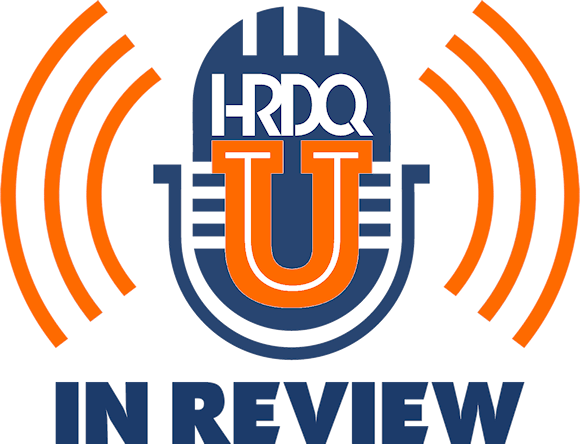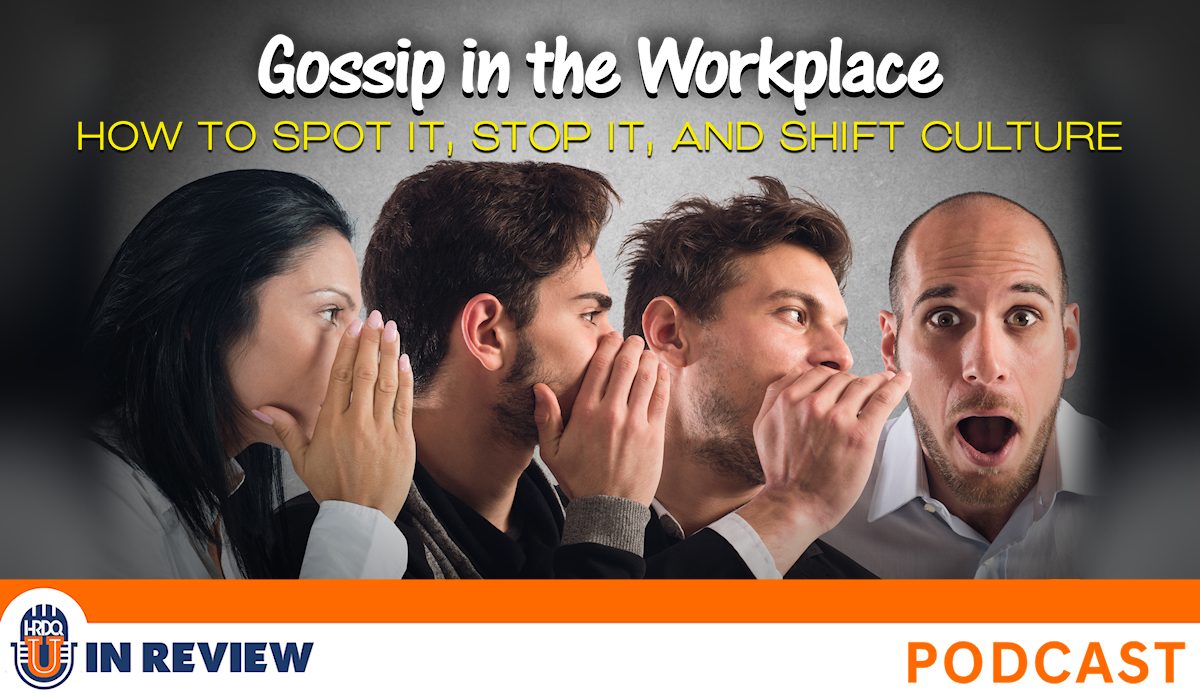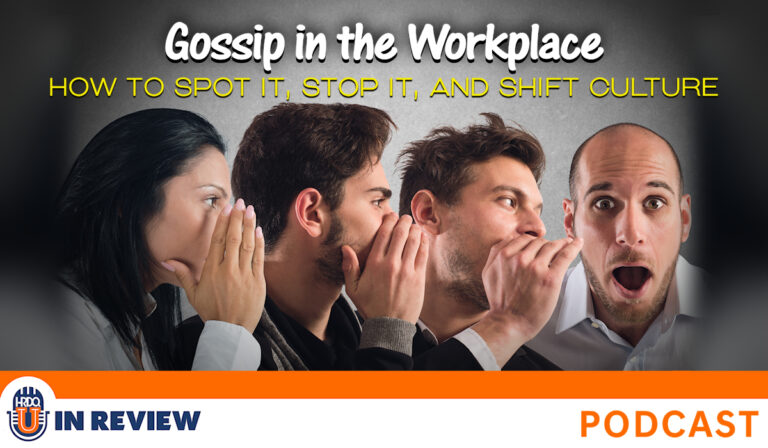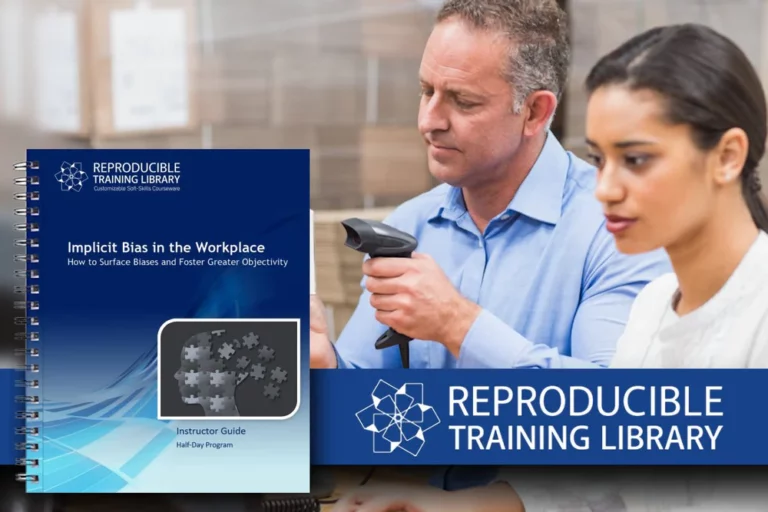

Host Sarah, Learning Events Manager at HRDQ-U, sits down with Marsha King to discuss one of the most relatable workplace challenges – workplace gossip. Based on her webinar, Gossip in the Workplace: How to Spot It, Stop It, and Shift Culture, Marsha shares insights into how workplace gossip starts, why it spreads, and how leaders can take steps to shift workplace culture.
She also opens up about her own experiences with workplace gossip – why it can feel good in the moment but ultimately harms trust, morale, and mental health. Drawing on her background in human resource and organization development, Marsha explains how emotions and communication dynamics drive gossip behavior and what organizations can do to address it effectively.
Action Items:
00:01
Welcome to this week’s episode of the HRDQ-U In Review Podcast, where we bring you the latest insights and practical tools for enhancing soft skills training in your organization. This podcast is brought to you by HRDQU.com, and I’m your host, Sarah, Learning Events Manager here at HRDQ-U. And today we are joined by Marsha King to discuss the webinar, Gossip in the Workplace, How to Spot It, Stop It, and Shift Culture.
00:25
Before we dive in, be sure to subscribe to our newsletter at HRDQU.com for exclusive updates, upcoming webinars, and resources to help you and your team excel. And also give us a follow and leave us a review on whatever platform you listen to your podcasts. with that, Marsha, welcome. Thanks so much for joining me today. Absolutely. It is such a pleasure to be here, Sarah. So Marsha, we have worked together too. You’ve done a webinar with us in the past. But for our new listeners,
00:51
anybody who’s tuning in that didn’t get a chance to watch this week’s webinar, can you kick things off here by sharing a little bit about your background and what led you to focus on workplace gossip and culture? I sure can. OK, so I will tell you, I didn’t wake up one day and say to myself, gossip is such an interesting topic. I think I’m going to research it and become really familiar with what it is and how to spot it and how to stop it. So but it was just one of those things that kind of evolved.
01:20
um as part of my area of work that I do. So my background is in human resource development and largely in organization development. And organization development is really all about cultures. you know, cultures are made up of people and people are made up of all kinds of things, capabilities, skills. And one of the biggest pieces of uh being a person is just the emotional side of us. And that is where gossip tends to come from.
01:49
And so, you know, I will say that one of the reasons I have gotten interested in gossip is because I have found myself getting caught up in it. And I’ll talk a little bit about this, but one of the implications to getting involved in gossip, I mean, there’s all kinds of negative implications. There’s some short term positive things, too. I mean, we do we we feel very.
02:14
good in the moment because it’s usually entertaining or fun or it’s like it’s it’s tension release. But the longer term implications are negative to us to our health to our uh mental health. And you end up feeling anxious and oftentimes guilty. And uh I have found myself in years past getting into a gossip conversation where after the fact I have I
02:42
felt bad about myself. I felt bad about being involved in the conversation. And I think that that’s the first time that, or the first thing that really kind of piqued my interest about gossip is, you know, it seems fun in the moment, or it seems like it’s a tension release in the moment, but the long-term implications to us personally, not just to the person being gossiped about, but to us, the one who is what I would call the gossiper.
03:10
ah the longer term implications are negative. And so that’s probably where my interest in it came from.
03:19
Yeah. And during the webinar, mean, we found out, you know, everybody, we’re human and everybody at some point or another has found themselves in a gossiping situation for sure. And being able to highlight that and notice it to be able to improve yourself. That was really great for this webinar so that we can all work on how we can better ourselves and avoid that. Right. Exactly. I’m sorry. Go ahead.
03:48
No, continue on. was just going to say, you know, when I talk about gossip and I do a session on on this sort of these sorts of topics, because I love that sticky, tough, difficult to talk about topics. love to talk about topics that no one else wants to talk about. So gossip is one of those. And one of the first things that I like to say is just because I talk about.
04:13
gossip and I sound like I know what I’m talking about, you know, and I have studied it and I’ve researched it and and I Would call myself somebody who knows a great deal about it. It doesn’t mean I don’t fall into it So I always like to start by saying I talk about gossip, but I’m not doing it in a judgmental way I get caught up in it too and The one of the biggest points about this conversation is that if we don’t if we are not intentional
04:42
about not gossiping, we’re going to fall into it because gossip sneaks up on us in many ways. Sometimes we think we’re sharing good information. Sometimes we think we’re venting. I call those close cousins to gossip. And so one of the biggest points I want to make sure to get across in this podcast is that no one is exempt. And you know, I’m at the top of that list. I’m not judging anybody. But second of all, if we’re not intentional about not doing it,
05:12
very easy to fall into. that’s, think, a really important point to make right off the bat. Yes. And now before we dive further into the content here, could you give us a refresher for those listeners that didn’t catch the webinar just yet? What’s the big picture? Why does gossip matter so much in the workplace? What were the key takeaways for our members, our audience listeners during our webinar event? So I think that the key takeaways
05:42
um are that one, we do it um unintentionally. I think that’s important to know. Sometimes we just fall into it. And if we do that, we can fall into something called a gossip cycle. And a gossip cycle, well, first of all, let me define gossip. Gossip is about sharing information about a person, oh an event that is based on our own opinion, not facts. It’s more about conjecture and the information can be damaging or
06:11
or ah to somebody’s reputation or even to the culture. So, I mean, those are two key points that are really important. It can be damaging to reputations and culture both. ah If you’re gonna damage somebody’s reputation or if somebody, let me rephrase that, if someone’s reputation gets damaged, that usually can lead to cultural damage also. So that’s one of the big things. Another key point is that we can get stuck into a cycle of it.
06:40
we’re participating in the spread of false information, it almost becomes habitual or routine. um And what we end up doing is sort of setting expectations that participating in this behavior is standard, standard behavior. And so I think that that’s probably the second most important point here is that it can become habitual and it creates an expectation that it continues. um And if it continues,
07:10
You know, it’s not only has it become habitual, but we can rewire our brain so that it naturally goes there. uh I think in the original discussion, I talked about how um I think about gossip as um kind of our neurons, like we create neuro pathways in our brain and our neuro pathways are just our natural ways of thinking.
07:40
And when we have our natural ways of thinking, ah they become habitual. So think of yourself as standing on the side of a forest and you want to get to the other side of the forest. And the way that you do that is you start creating a path. And so every day you go from one side to the other side, you create this path, you step on twigs and remove limbs and you create a pathway. And then that becomes just like the path of least resistance. That’s how you operate. ah
08:07
We do the same thing in our brain. We create, recreate these neuro pathways. And if we gossip, it becomes habitual and routine. And we create this neuro pathway that that’s the path of least resistance. And so it’s hard to get out of it. So if you want to remove that neuro pathway, you’ve got to create another one and let the old one grow over. So think of yourself as still, you know, on this side of the forest and you want to create a new pathway, you’ve got to start doing the same things again. You’ve got to start walking across the
08:37
forest, stepping on the twigs and removing limbs and creating a new pathway. And in the process, the old one starts to grow over. And so your best prevention is to not allow yourself to create that pathway in the beginning. So once you’ve started it, it really does become somewhat habitual. And so and we wire our brains get wired for it. And so what we want to do is allow that old pathway to to be overgrown.
09:06
with other ways of responding. And so, and I’m sure we’re probably gonna get to that other ways of responding when you’re ready to ask that question. Yeah, and so many people think that they’re just venting or they’re being caring. How do you actually know what you’re saying is gossip? Okay, that’s such a good question. So I try to make this distinction between gossip. So gossip is about talking about somebody that could be damaging to the reputation. Okay.
09:36
Some of the characteristics is that it spreads unverified information. It’s usually harmful to the target and the gossiper, the person saying the gossip. Venting, we like to think of venting as healthy and that we need to find a friend to have a conversation with, to blow off steam, to release tension. We think of that as a healthy thing and it’s actually just gossip in disguise.
10:03
Now, sometimes you start out blowing off steam, but think about that. The steam is usually directed towards a person or a group of people. And so we think of it as venting, it really very quickly just turns into gossip. And so venting is another way to create those neuro pathways. And so we, you know, we in this field, we say what fires together, wires together. And so if, if our neurons are firing together,
10:31
um around a particular topic, they wire together. So venting has the exact same problem with creating that neuro pathway. So one is equally as difficult as the other, even though our intentions in the beginning may be different, they’re very close cousins. Now, sharing information is generally okay, even if it’s negative information. So I don’t want people to leave this thinking you can’t say anything negative.
11:01
There is information that needs to be shared that may be negative. That doesn’t mean it’s gossipy. If it’s factual, um chances are you’re sharing information even if it’s negative. making a factual statement about something negative that had just happened in the workplace that you need to overcome, that’s not gossip. Now, if you blame somebody and you try to…
11:29
make it appear as though it’s that person’s fault or point out that person’s characteristics that led to that, then that can become gossip. But sharing information is not gossip. Venting gossip, I would say they’re cousins, but sharing information is fine.
11:46
Now you were saying essentially how venting is kind of just opening up the door to start gossiping and that can be those dangerous, like the dangerous line there. What about how do people manage bottling up their emotions or their frustrations um to ensure that they’re not gossiping but still being able to get that release of making sure they’re not bottling up all their feelings? Yeah, I definitely don’t recommend bottling up feelings.
12:15
I recommend finding healthy ways to release them. So healthier ways are like self-reflection. ah Sometimes it’s taking a walk. Physical activity is a great way to release steam. uh Reflection is a great way to release steam. Focusing on how can I change to make the situation better? Or how did I contribute and how can I do it differently next time? What can I learn from this? ah How can I redirect this situation?
12:45
So there’s a lot of ways to put your energy into a more positive direction that will allow you to release that steam. there are unhealthy ways to manage this, there are healthy ways to manage this. And I definitely recommend figuring out what are the healthier ways for you to manage. For me, some of us are internal processors. I’m an internal processor. So I usually don’t react in the moment. What I do when something happens is I leave.
13:14
and it starts brewing, I call it steeping, my negative emotions inside start steeping. What I’ve learned to do is talk myself off this mountain. And I’ve recognized that this is a pattern for me and that I need to recognize that, okay, I’m allowing myself to go to this really negative place when it may not even be true. So I’m allowing my emotions to control me instead of me controlling my emotions.
13:42
And so, you know, in the discussion we had, I talked about the emotional intelligence ah framework, the self-awareness, self-control, social awareness and relationship management. And within each of those, there are several positive things that you can do to um express the emotions or let the emotions um or redirect the conversation in really healthy ways.
14:11
Let me just give you a couple of examples. So in self-awareness, if you are self-aware or try to be more self-aware and try to figure out what triggers you, what triggers your desire to gossip, we all get triggered by something, you know, and if we really pay attention to it, we can start feeling it in our body before we actually do it. There’s always a stimulus and a response. You know, there’s a stimulus that makes us want to gossip. There’s a response, which is often the gossip.
14:38
But there’s this little gap in between where we have a choice to make a different decision. so figure out when you’re getting ready to do it and then get into that little gap and make a different choice and have those choices ready to go. Again, if we are not intentional, that stimulus is going to lead to the same response over and over. being intentional means getting into that little gap and having different
15:06
approaches or different ways to handle it ready to go. For me, I have what I call, what do I call them? They’re like sentences or like little phrases that I have ready to go when something happens. So let’s say I’m triggered and I immediately want to go to someplace negative and participate in bashing. And so I’ve got a couple of phrases that I have ready to go, such as, let’s redirect this to the
15:35
topic at hand or let’s get back to the point of why we’re here or you know I find a way that helps to redirect the conversation that is firm but also kind. You you don’t want to you don’t want to be a jerk because then you come across as judgmental. So you know you don’t want to say something like yeah that’s gossip I’m not going to participate so let’s move on. Instead you’re going to say something more like um let’s why don’t we get back to what we’re supposed to be getting to.
16:05
at the moment, you know, we’ve got this project to get done and you know, not a lot of time to do it. So let’s get back to the topic. So that would be a firm but kind way of saying, let’s stop talking, let’s stop gossiping, or let’s not start gossiping. em In self control, probably one of the best suggestions I have is really define, spend time thinking about who
16:32
do you want to be thought of? What do you want your professional reputation to be? And then you back into that with your behaviors. And let me tell you, you do not want to be known as a gossiper. No, it will not end well. Nobody with a reputation of being a gossip um is never thought of well. identify, what are the things you want to be known for? So like, I want to be known as somebody who really cares deeply about people.
17:01
and that I want to understand people even beyond, even before I feel understood. So I want to be known for that. That’s part of my reputation. So I recommend everybody figure out what do want your reputation to be and then back into that with your behaviors. With social awareness, the fourth quadrant to the emotional intelligence framework, I think a really good suggestion there is to
17:29
Identify with your people that you’re around. What do you think motivates them to gossip and then just avoid it? You know, don’t even tempt them. Don’t put them in a position where they’re triggered. So be kind to them, help them to stay away from it. And if you find somebody who goes into gossip constantly or too quickly, have a kind conversation with them, pull them aside and say, you are such a great person and I care deeply for you.
17:58
um But when you go into, when you start venting or when you start blaming other people, it makes you look bad. Not them. It makes you look bad. So pull them aside and try to help prevent it from happening for the people around you. The fourth quadrant in this framework is relationship management. And the best advice I could give on that is to try to create relationships that are principle based. They’re based on positive things like
18:28
elevating people, elevating self, elevating others, instead of building, you know, we, we create a lot of relationships based on drama and trauma. You know, we’ve even got this term called trauma bonding, and we build a lot of relationships on trauma bonding. And um sometimes I think that they, they, they serve us okay in the moment, but it needs to be fleeting. So it needs to serve its purpose quickly and then move on. So
18:57
If you create relationships that are purely based on trauma or drama, those relationships are going to be short lived and they’re going to be very shallow. And so you want to build deeper relationships with people that they elevate you and you elevate them. That was a long, that was a very long answer, but those are some, I think, great suggestions on how to handle ah gossip situations using the emotional intelligence framework.
19:28
Yes, absolutely. And let’s flip it here now. So if you find out people are gossiping about you, what’s the smartest way to handle it? You need to go to them privately. You need to go to them privately and be honest with them and say, you know, again, probably the best personality style that you can have is to be strong and kind. You know, think about someone who’s strong and not kind. They’re a bully. You know, you don’t want to be a bully.
19:56
But think about somebody who is kind and not strong. They’re a pushover. You don’t want to be a pushover either. So really start focusing on what are the traits or behaviors that you want to demonstrate that will demonstrate you as strong and kind. And if somebody’s gossiping about you, the way to do that is to go to them and have a direct conversation. And always start the conversation by saying, I’m coming to you because I’m concerned about a couple of things. One, our relationship.
20:25
One, some of the things I’m hearing. And two, I want to confirm that you and I have a positive relationship and to do whatever it takes to make sure that happens. uh But then also stop and pause and listen to them. Again, your goal really should be to understand before being understood. And so you might think somebody’s gossiping about you and they may not be. So.
20:54
I think that’s the first thing you’ve got to figure out is, it true? But then go into, I really want us to have a, I want us to have a good and healthy professional relationship. And this is what I need from you to do that. And also this is my commitment to you to also help with that. I’ve actually had that conversation with a, who I would call a very dear friend. We had a terrible relationship at one point and,
21:22
I would have to say she’s one of my favorite colleagues now, but it’s because, and I would say she was the one who initiated the tough but kind conversation. And I decided to take her lead and participate in this healthy conversation. And it was fantastic. And now, you know, again, I consider her one of my favorite colleagues and a trusted colleague. She’s, somebody that I know would look out for me and I would look out for her for sure.
21:50
Now this is a tricky one here. What about power dynamics? How should someone respond if their boss or manager is the one that’s doing the gossiping? Yeah, see that is so difficult. is, it’s like so many people would say I wouldn’t touch that with a 10 foot pole. But you know, it depends on your relationship with your manager. And if you have a really good relationship with the manager, you could have a similar conversation. Now I am not,
22:20
naive enough to think that that could happen very often. I don’t know many people who could go to their manager and say, you’re gossiping, it’s not a good thing, it’s not a good look on you. So I know because there’s this positional power, the power dynamic that you mentioned. uh And so I think that one of the ways that you could do manage that is to find ways to redirect the conversation, just to keep it away from the gossip. Also,
22:50
Identify what triggers your manager to gossip and do whatever you can to prevent that from happening. um The third way is just to role model good behavior and not participate. You know, when you’re with somebody and they start to go down that gossip trap and you turn the conversation around by saying something like, how can we help this person? So let’s say your manager is bashing one of your peers.
23:19
which is just such a terrible thing to do, but it happens, right? It happens. eh The best way to get out of that conversation, because it’s one, it’s unfair to put you in it, right? Your manager’s bashing your peer. So a really good way to handle that is to respond with something like, uh I hear your frustration, but what is it that you think you could do?
23:46
to prevent this from happening? What is it that you think as the manager? What would be your responsibility or how could you help this person? And by the way, is there anything that I could do to support you in that? And if your response is that or similar to that, let me tell you, they’ll never gossip to you again. That’s kind of it. They know they’re not gonna get what they em are looking for. If they’re looking for gossip, they may not be looking for gossip. They may not even know they’re gossiping. They may just be venting.
24:15
But if that is the case, one, you’ve just given them some really good suggestions, but two, probably won’t happen to you again.
24:25
Now does gossip still count if it happens outside of work hours, such as say you’re talking to your spouse, your friend, someone outside of the organization, or is it only a problem during the nine to five? It absolutely happens outside of work. Now, if you’re doing this with your spouse, you’re blowing up some steam with your spouse and your spouse is somebody who is your voice of reason. So I’ll use my spouse as a great example. If I’ve had a rough day at work and I feel unfairly treated,
24:54
I may go to my spouse and say, you’re not going to believe what such and such did to me today yet again. But I have a spouse who’s going to be my voice of reason and is going to really help me to make sure that my emotions are under control, that I have control over my emotions. They don’t have control over me. And so if you have that situation, then have at it. That’s wonderful. That’s wonderful. But if we’re talking about gossip that is you and a group of
25:22
coworkers go out for drinks and the conversation ends up going towards your, you know, the manager that none of you like, then that’s gossip. So yes, then it does, it does happen after work, outside of work hours. In fact, it could be, it gives us a false sense of security because it is outside of work hours and we’re not in the office. And so it’s even more dangerous and a lot easier to get into a gossip conversation.
25:52
during that time.
25:55
And now say you find yourself getting pulled into the gossip cycle. How do you break free of it without damaging those relationships? OK, so there’s a bunch of stuff you can do. So redirecting tactfully is probably the best way. And so come up with your phrases like, let’s get back to our goal for this conversation. Or maybe we should focus on the project right now. Gently redirect the conversation. ah Don’t participate.
26:25
Don’t respond. Or if you do respond, respond back with something like, can we help this person? What can we do to make this better? Or how are we contributing and how can we be better and make the situation work better for all of us? And then of course, modeling. All of that is modeling good behavior. those are great ways to… It not only stops it in the moment, but…
26:53
it has a very good chance of impacting the culture in a positive way. If people start picking up on what you’re doing and they start doing the same thing, they start imitating you, that um can have a very positive impact on the culture. I actually had a manager who did that. I saw him in action doing this and it was in a group setting. And um what you saw after that is other people imitating him.
27:21
and doing the similar, you know, the redirecting and the how can we help the situation or how can we make sure that we’re not making the situation worse. So um there’s a lot of things you can do, but just demonstrating that good behavior can have really long-term and far-reaching impact, positive impact on the culture.
27:46
And that’s a great lead in here to my next question for you. set the tone. What can managers or executives do to shift a gossip heavy culture into a healthier one? Model the behavior, first of all. Number one, don’t allow yourself, as a manager, don’t allow yourself to get wrapped up in it. Now, that doesn’t mean avoid the emotional side either.
28:10
So as a manager, it’s a delicate balance. So let’s say you’re a manager and someone comes to you and they’re very hurt by what one of their coworkers said about them. You can’t deny it. I mean, if somebody’s feeling some way, you’ve got to acknowledge it and allow them to see that you’re validating that their feelings and their emotions are real. But then go into the conversation about how can we make this better?
28:40
How can we make sure that this situation doesn’t happen again? Do you want to have a conversation with the person who offended you and would you like me to attend? Is there anything that I can do to support you? But managers, one, need to model the behavior, but to the degree that they are able to get people to take accountability for their own behavior in gossip situations, the better. So you don’t want to be a manager who spends their life
29:09
um spends their work hours managing gossip situations. So a manager should really focus on helping their employees learn how to more effectively manage these types of situations. Because a lot of the principles I’m talking about don’t only apply to gossip. I mean, they also apply to things like conflict. And so the manager sets the tone by demonstrating good behavior.
29:38
They validate feelings because feelings are real. If they don’t validate the feelings, then people are not gonna feel heard or understood. When people don’t feel heard or understood, they have a hard time moving forward in a positive way. So validate the feelings, but then move into how can we make this better? And is there anything I can do to help you with that? Not easy, I’m making it sound like a piece of cake, but it’s not easy.
30:04
Could gossip ever be positive, like a way to build connection, or is it always harmful? Well, if you look at the true definition of gossip, it’s always damaging. Now, we can also go around saying positive things about people. I say do that all day, every day. Say positive things about people as often as you can, as long as it’s authentic. ah But don’t make no mistake, that’s not gossip. That’s just saying positive things about people.
30:34
And that’s a very good thing. That’s a way to create a positive culture. It’s a way to build relationships. It’s a way to build trust. That’s a great thing, but it’s not gossip. So to the question, is gossip always bad? Yes, it is. If you look at the true definition, it’s because it’s untrue information that’s being spread that’s damaging to somebody’s reputation. Always bad.
31:00
And before we wrap up our conversation here, if listeners could walk away with just one action step to reduce gossip and strengthen workplace culture, what would it be? I would say I’m going to go back and I’m going to repeat something I said earlier and it’s figure out, spend time, figure out what kind of a person do you want to be? What is, what kind of a person, an employee, a leader, a manager do you want to be? And really be clear about that. Do you want to?
31:29
To be, like for example, I wanna be somebody who is known for honesty. I wanna be somebody who is known to be authentic. I wanna be someone who is strong but kind. um So figure out what are the things that you want to become known for and then back into that with the behaviors. I even write these out. I have them in front of me and I use these as reminders every day. I’m going into this meeting and
31:57
You know, the things I’m going to demonstrate are really positive behaviors. I’m going to make sure that um I don’t point fingers at anyone. I’m going to make sure that I take accountability for anything that I need to take accountability for. Sometimes I take accountability for things I shouldn’t even have to take accountability for. But I want to demonstrate those good behaviors for the people around me.
32:22
When you are clear about that, when you can sleep at night. So no matter what you do, have, you are who you want to be. And now you may find that you’re still going to get stuck in certain situations. People may still point fingers at you or gossip about you, but rest assured, um, in the long run, you will still be the authentic person that you set out to be. And that’s what matters. Gossip is…
32:52
know, gossip is just, kind of, I kind of think of it as like something that weak people do. It’s like a weak reaction. And so think about to yourself, what are strong reactions? What, and they’re usually harder by the way. Um, but that’s okay. That builds strength. It builds resilience. It builds tenacity, all of those things. I also want to be a person who’s vulnerable.
33:16
I don’t want to appear to be something that I’m not. I don’t want people to think that I feel like I am better than others when it comes to things like gossip. I want to be real. I want to be authentic. And so figure those things out and then back into those things with your behaviors and your words. Your words are the most important behavior that you have are the words that you use with people.
33:41
So that would be my biggest. That’s a great note. Great note to end us here. And lastly, where can people go to learn more about your work and connect with you? So I teach at the University at Buffalo. I am the director of the Leadership Coaching Certification Program. And um you can connect with me there. You can go to the website, just type in University at Buffalo Leadership Coaching Certification. My name and photo will pop up immediately.
34:11
Um, as well, my email, my email address is marshaking@buffalo.edu. Reach out to me anytime. I am so happy to talk to anybody about this topic or other related, tough, difficult, sticky topics. Um, because, know, my mission is to make organizations better and, um, organizations start with people.
34:42
Well, thank you, Marsha, for your time today and for sharing such important information with us. It was a pleasure as always. Sarah, you’re awesome. You’re a great facilitator and it’s been fun. So much fun. And we hope that you enjoy listening to the HRDQ-U In Review podcast, available on all major streaming platforms. If you did enjoy today’s episode, make sure to give us a follow and leave us a five-star review. Thank you all for tuning in to this week’s episode of the HRDQ-U In Review podcast, brought to you by HRDQ-U.


Listen to this podcast event at no charge with your
HRDQ-U Free Access Membership
Host Sarah, Learning Events Manager at HRDQ-U, sits down with Marsha King to discuss one of the most relatable workplace challenges – workplace gossip. Based on her webinar, Gossip in the Workplace: How to Spot It, Stop It, and Shift Culture, Marsha shares insights into how workplace gossip starts, why it spreads, and how leaders can take steps to shift workplace culture.
She also opens up about her own experiences with workplace gossip – why it can feel good in the moment but ultimately harms trust, morale, and mental health. Drawing on her background in human resource and organization development, Marsha explains how emotions and communication dynamics drive gossip behavior and what organizations can do to address it effectively.
Action Items:
[ PODCAST PLAYBACK ]
You must be signed-in with your membership account to access this content.
Enjoyed this podcast? Have suggestions on how we can improve? Please take our quick survey and receive a coupon for 15% OFF any of our individual membership plans.

*Instant 15% coupon available upon completion of survey.
Want to learn more? Become an Individual or Corporate member to watch this and hundreds more webinars!
Gossip in the workplace can harm culture, damage relationships, and reduce productivity. Learn how to spot, manage, and stop harmful gossip effectively.

Marsha King
Marsha King, Ph.D., is the President of Polaris Leadership Consulting and is also a well-respected speaker and faculty member at the University at Buffalo, where she oversees their Leadership Coaching Certification Program.
Marsha has a Ph.D. in Organization Development from Penn State. In addition to Penn State, she has also been on faculty at Northwestern University, Georgetown University, and George Washington University. Marsha was a Managing Vice President for Capital One.
The University at Buffalo’s Coaching Certification Program is part of CLOE, which is focused on advancing research, education, and outreach in leadership and organizational development. With a range of programs that can be delivered in person or virtually, CLOE partners with organizations to help them solve their most pressing leadership problems.

The University at Buffalo School of Management’s Center for Leadership and Organizational Effectiveness (CLOE) strives to create more effective leaders and organizations by advancing research, education, and outreach in leadership and organizational development. Programs offered by CLOE include a Leadership Coaching Certification Program, an Accelerated Leadership Program, and customized programs.
Training Tools for Developing Great People Skills
This event is sponsored by HRDQ. For 45 years HRDQ has provided research-based, off-the-shelf soft-skills training resources for classroom, virtual, and online training. From assessments and workshops to experiential hands-on games, HRDQ helps organizations improve performance, increase job satisfaction, and more.

Implicit Bias in the Workplace Customizable Courseware
Explore the hidden influences behind your decisions and discover how to reduce their impact at work. Learn practical strategies to recognize bias, respond effectively, and promote fairness and objectivity. Develop the awareness and skills needed to foster a more equitable workplace for all.
Buy at HRDQstore.com
Trust: The Ultimate Test
Uncover strategies to strengthen the foundation of communication, collaboration, and team success. Learn how to build and restore trust, understand the impact of your actions, and create a workplace where people feel confident depending on each other. Cultivate stronger relationships that drive lasting organizational results.
Buy at HRDQstore.com
“It was the education I was looking for in using tools to negate gossip from our work culture.”
Danielle S.
Health Professional
Social Services

I learned how gossip can affect the target, organization, gossiper, and workplace culture & team morale. Gossip can also be used as a vehicle of exaggeration to amplify one’s voice. I am looking forward to practicing the WAIT acronym – Why Am I Talking? – when I am encouraged to respond or engage in gossip.
Da’Vian S.
Service Coordinator
UMBC

“The information was mind-blowing – never looked at it from that perspective before.”
Lisa O.
Supervisor
Kreider Services Inc.
The HRDQ-U In Review Podcast, brought to you by HRDQU.com, brings you the latest insights and practical tools for enhancing soft-skills training in your organization. As a learning community for trainers, coaches, consultants, managers, and anyone passionate about performance improvement, we interview subject matter experts and thought leaders from recent webinars they presented with us to take a deeper dive into the content they shared and answer all your questions. Join us as we explore new ideas and industry trends, share success stories, and discuss challenges faced by professionals.
The HRDQ-U In Review Podcast is intended for HR and training professionals, organizational development practitioners, and anyone interested in improving workplace performance and productivity.
New episodes of HRDQ-U In Review are released every week.
The length of the episodes varies, but they typically range from 15-30 minutes.
The podcast covers a wide range of topics related to HR and organizational development, including leadership development, team building, communication skills, conflict resolution, employee engagement, and more.
No, HRDQ-U In Review is completely free to listen to.
You can listen to any available HRDQ-U In Review Podcast right on our website at HRDQU.com via our embedded Spotify player on the related webinar page. In addition to our self-hosted option, you can find the HRDQ-U In Review Podcast on many of the popular streaming services, which are listed above.

Download our catalog of our top 20 most popular webinars.